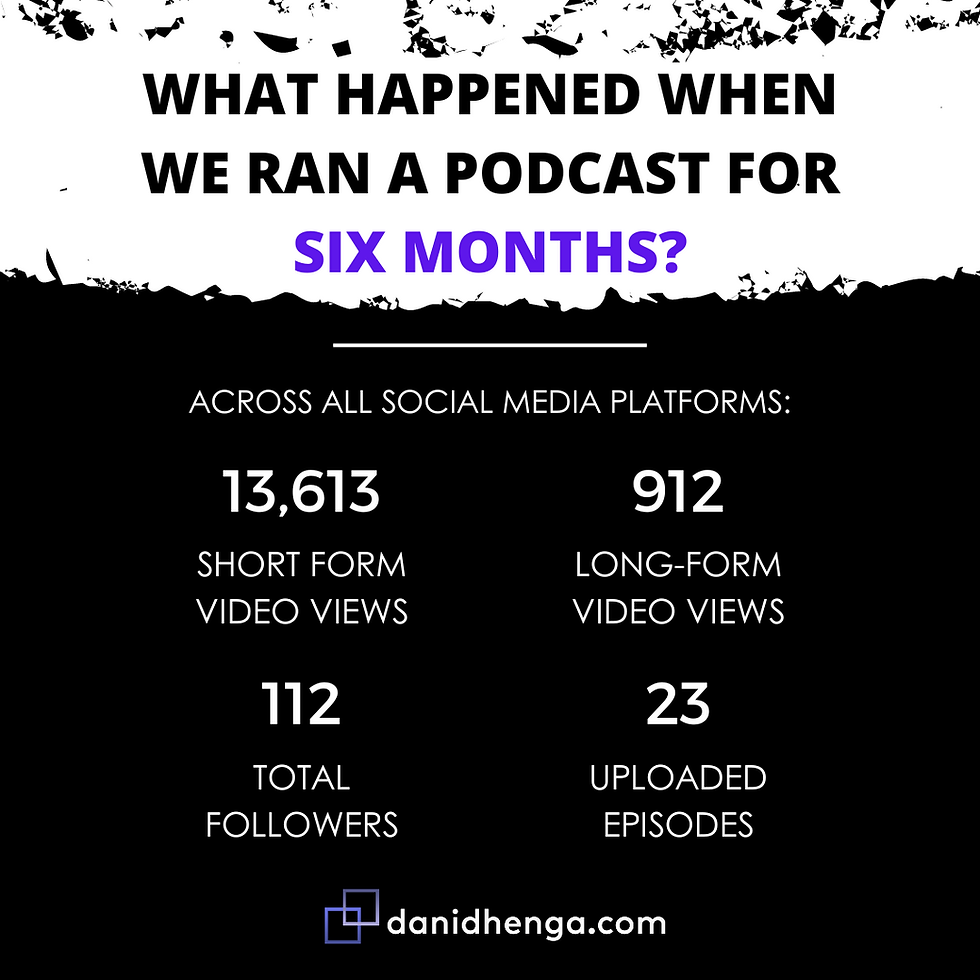“How Founders Can Survive and Thrive During a Recession” | Dan Idhenga
- Dan Pandeni Idhenga
- Jun 20, 2022
- 4 min read
Updated: Jul 22, 2024
I’ve spoken to several worried founders in the last few months who don’t know how to manage the current challenges in the market. Here are five ways startups can navigate today’s financial conditions.

From what I’ve noticed, the answers might lie in carefully utilising your resources, thoroughly understanding your business objectives, being realistic, and ultimately being flexible. Startup funding has slowed massively this year with at least 44% of economists predicting a US recession.

Source: Wall Street Journal surveys of economists
Crunchbase also illustrates a massive slowdown in Startup funding this year. This trend appears to come from common sentiment of a US recession within the next twelve months.


Source: Crunchbase
As the global slowdown in startup funding continues, investors are being more careful with their money. This will have a particularly potent impact on companies in emerging economies like Africa. For example, in 2021, 80% of Africa’s $5 billion in startup funding came from international investors.

Source: Bloomberg.com; Partech Partners
1. Be flexible, incorporate new technology, and pivot if necessary.
Flexibility is essential for start-ups during difficult times. Without flexible leadership, start-ups often get stuck in a routine which might not be conducive for the current environment. Consider new perspectives, especially those from your team. Your team will have different evaluations and insights which can guide you on your journey as a founder and hopefully keep you afloat during a recession. The pandemic forced flexibility in 2020, especially when it came to new technology integrations (does anyone remember Zoom?). As demonstrated by the Databricks 30 Index, companies which properly invest in technology outperform the market significantly.

Source: databricks
2. Understand your pain points and objectives.
As a founder you need to really understand the ins and outs of the business. If you can do this, you will approach difficult market conditions with a clear head and maintain your focus on the company mission. Find out where your startup can improve and what your core objectives should be in difficult times. If you can’t decide what type of business you want to run how will your employees be effective in their work? More importantly, how will you lead them? Consider putting together a well-reasoned set of targets for your business and get real and regular feedback from your team.
3. Stretch your runway, significantly.
As obvious as this may seem, there are countless examples of companies which have secured funding and blown it away because of their reluctance to extend their runway. Companies that are not careful with their spending during difficult times are fundamentally unsustainable. This is why the people you allow into your company as leaders or investors are so important. They can make or break you because of their discipline or lack thereof.
Do you remember Fast? They raised $120MM in 2021 (earning them a valuation above $1 billion) and still ended up shutting down this year. If their leadership or board had been diligent in promoting responsible spending, they would have plenty of money left to endure the changing market conditions of 2022. To avoid this situation, make sure you prioritise spending, focus on your core product or service, and make sure you get solid input from those around you.
4. Keep morale high and only drop talent once.
While you may want to cut your spending, I always advise founders to think twice before cutting talent. Talent is the most valuable resource in your company and hopefully you were able to hire a passionate and dedicated team. The effort required to rehire and retrain after a cut doesn’t seem worth it most of the time. If possible, consider reducing hours worked as opposed to fully cutting employees out.
On the other hand, if you’ve considered it carefully and you still believe that your company needs a reduction in headcount, make sure you only do it once. Startups like Bird, have recently cut almost 23% of the company, while this is a painful decision for any company, this approach, while huge, is much better for future company morale than repeated layoffs.
For example, Coinbase has recently laid off about a fifth of its workforce and refused to rule out job cuts. The potential damage to employee confidence and the potential for multiple, sporadic staff cuts could damage the company’s long-term morale.
5. Be realistic with your valuation and careful with your spending.
A bitter pill to swallow for many founders is that economic downturns really require a realistic approach to fundraising. Naturally, most founders are extremely keen to receive a high valuation. However, today’s unstable conditions makes sourcing capital much more of a challenge than in 2021, where startups broke records by raising more than $621 Billion.
While it’s challenging to be humble, the founders who are careful and realistic will be the most successful in getting the funding they need and spending it carefully. Keep in mind that companies like Facebook were able to raise money in poor market conditions in 2008, and still managed to pull through. In fact, raising money during these times might be beneficial, shaping the future character of the business and leading to superior long-term performance.
As a founder, you can learn a lot from these examples because their experiences do not need to be yours. Try to avoid similar situations, and keep your team's morale high.






Comments